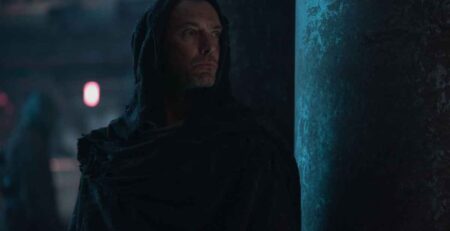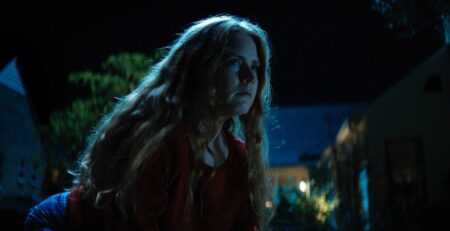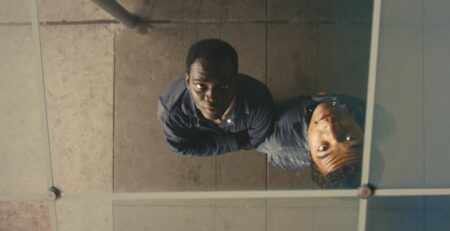
Welcome to Utmark is a Norwegian drama created by Dagur Kári and Kim Fupz Aakeson streaming now on HBO Max in the United States. It’s the story of a small, remote community in northern Norway and all the twisted and tragic lives its members live.
Nothing good ever happens in a small town on TV. With an ensemble cast and at least a dozen overlapping lives and stories between them, Welcome to Utmark is a story filled to the brim with bad happenings. We begin with Finn (Tobias Santelmann) and Siri (May-Linda Kosumovic), a couple that just isn’t working, no matter how much they love their daughter Marin (Alma Günther). Finn is a sheepherder and an alcoholic, and Siri has been cheating on him with Biltzi (Stig Henrik Hoff), the local reindeer herder and strongman whose house is among those she cleans with her cleaning business.
The cast of characters is rounded out by Heige (Marius Lien), Biltzi’s half brother, Willhelm (Nils Johnson), the corrupt local sheriff, Håvard (Niklas Gundersen), a mortician, Stein (Gard B. Eidsvold), Drita (Rozafa Celaj) and Elena’s (May-Linda Kosumovic) pimp, Kari (Kamilla Grønli Hartvig), the new school teacher, and a host of other interesting characters. Everyone has their own arcs, showing how their lives happen to intersect with one another. It’s a small community. Everyone is in everyone’s business, everyone is friends, everyone hates each other, and there’s not even a rumor mill, just straight up truth about everyone at all times. It’s glorious.
The show doesn’t have much of a specific plot to follow besides the core family drama between Siri, Finn, and Marin and the rivalry between Finn and Biltzi. But it doesn’t need one either. The drama between each character is more than enough to carry you through the eight episodes and then some. It’s instantly bingeable. Everything is fairly well tied together thematically though, further entrenching the interconnectivity of the characters and their stories. They’re challenging themes, though, mainly featuring family, honor, and abuse. No character stands clearly on one side of the good-person-bad-person divide, even if some are clearly meant to be rooted for over others. “Good” people do plenty of bad things, and “bad” people are made sympathetic early on and often.
One of my favorite parts of the series is how much of it is told from Marin’s perspective. You’re shown different characters’ perspectives throughout the show, but hers is always the strongest. As a kid who’s intelligent, hopeful, and caring, she’s far from oblivious to all the bad ways her parents act, the abuse her mother suffers from Biltzi, and ultimately, just the difference between right and wrong. She’s still a kid, of course, far from a paragon, but seeing the community through her eyes always provides clarity and much of the show’s emotional weight.
One minor frustration I had was that Biltzi is so clearly the show’s “villain,” despite some sympathetic qualities. His being Indigenous Sámi is sometimes portrayed as one of the factors contributing to his villainry. He is stubborn, proud, and constantly harping on his Sámi heritage. It’s often just some good representation of Indigenous culture, but every once in a while, it comes to feel like he’s a bad person because of his being Sámi. The same can be said of his mother and uncle, who was literally in prison until he suddenly appeared in town. The clear Christianity of the community sometimes feels like unintentional contrast pitting the good Christians about the corrupt Sámi. I don’t think it’s intentional, and obviously, every person in the show is a bad person for one reason or another, but none of them are depicted as the villains besides the Indigenous folks.
On the other hand, the treatment of queer characters is definitely better. While none of them are really able to express themselves fully and openly, they’re also not treated as pariahs either. I might worry about what might happen to some if Welcome to Utmark continues into a second season. Still, the way Marin and Drita, in particular, interact with one another is really great and normalizing compared to the way TV feels like it usually has to make a bigger deal out of certain expressions. Eventually, one might get turned into a negative plot point, but the other actually has a really positive ending.
The music, setting, and camerawork are all mostly strong contributors to the atmosphere. The backcountry shots, the alternating pensive and suspenseful music, and the many tiny details in the numerous sets create a perfect small community atmosphere. Unfortunately, there’s one very odd camera moment in the final episode. While I do hope its inciting incident is explored in a second season, it’s just very out of place in an otherwise crisp show.
Welcome to Utmark is an excellent slow burn about the twisted open secrets of a small community and the way people’s lives consistently touch one another.
Welcome to Utmark is streaming now on HBO Max.
Welcome to Utmark
-
Rating - 8.5/108.5/10
TL;DR
Welcome to Utmark is an excellent slow burn about the twisted open secrets of a small community and the way people’s lives consistently touch one another.




